Christine Cameron Sixties Scoop child speaks out as activist

By Kelly Anne Smith
NORTH BAY—Artist, activist, mother, grandmother, and student Christine Cameron is also a teacher of history—sharing her story as a Sixties Scoop child. Christine was recently featured in an Anishinabek News story about the Nipissing First Nation 5th Annual Annishnaabe Art Show. The next night she would lead North Bay in a vigil, Justice for Tina Fontaine.
Artist Christine Cameron is excited for the September start to her third year at Nipissing University in Fine Arts. Intent on a four-year degree, she is after the expertise, training, and studio time.
“Nipissing university has been really good at teaching me the technical aspects of painting.”
Cameron specializes in portraiture. Her oil paintings are brilliant with colour and detail, capturing the powerful of the animal world in serene moments within their surroundings.
“I’m from the Little Pine First Nation of Treaty Number 6, Paynton, Saskatchewan. That’s close to North Battleford and it’s right side Poundmaker, so I’m of Plains Cree and Sioux heritage.”
Cameron is frustrated with the injustices of the recent court cases and acquittals in the deaths of Colten Boushie and Tina Fontaine.
“Sadly, it’s not something new. It’s a systemic problem with our country in government policy for decades.”
Cameron educates on the four waves of attempted assimilation in Canada.
“The first way was residential school – Canada’s first attempt at assimilation. The second was the Sixties Scoop. The third is child welfare and the fourth is the injustice in our court systems.”
Taking children from birth was a sweeping attempt at assimilation says Cameron.
“The Sixties Scoop was probably Canada’s most sincere attempt at assimilation. Because it took children from birth and severed all ties with their First Nation, their community and their biological family and their culture…To have some acknowledgement finally in 2017, last fall, that it was a grievous error on behalf of the government. That was impactful…I grew up in a non-Native home. I wasn’t connected to my nation or family. I didn’t even know I had brothers and sisters until I was 18.”
“In Saskatchewan, it was called the AIM program or Adopt Indian and Metis. They would advertise us in newspapers like pet-of-the-week – Sundays Child. They would advertise Aboriginal children and brothers and sisters. But I come from a family of seven so nobody was going to adopt seven children at once so we were all broken up and sent all over the United States, Canada and the world. There are adoptees sent in New Zealand, and in England.The problem is Canada has said, ‘Ok, you as a Sixties Scoopie, we are going to rewrite your history. You are not entitled to your biological history.’”
“My brother was adopted to Pennsylvania. He doesn’t have any citizenship in Canada. He was born in this country. So, everything was severed, Treaty rights, everything. We essentially became totally assimilated and immersed in white culture. Once we were 18, then we could apply for our status…Nobody knows the extent that the Canadian government went to assimilate us, to sever all ties. Even today it’s been tooth and nail to try to get my own birth records, to try and find my brothers and sisters or to get any information. And still my birth certificate says that I was born to my adoptive parents,” says Christine as her voice quivers as she holds back the tears.
She slowly continues to explain she and others like herself are baffled at the lack of compensation for Sixties Scoop children.
“So, the settlement recently announced by the Canadian government is less than 10% of what was announced for residential school victims. 750 million dollars across Canada will equal out to maybe $10,000 for stealing my whole life and rewriting my own history?!”
“I tend to be an activist now that I have the education and I have the experience and the wherewithal to go out and do things on behalf of the Aboriginal community. And after four decades of silence, I am finally going out there to better my people and to empower us. We have to tell our stories and say that this is wrong. This has happened…Canada, again and again has failed Aboriginal people through their government policy. And for the justice system and Canadian society to treat us so badly, the Canadian government taught us to do that. The government is showing all of Canada how to treat us because they’ve been treating us badly, ‘Let’s get rid of the Indian problem.’ That’s why there’s such a backlash today.”
Activist Christine is balanced with artist Christine. Christine Cameron’s artwork envelops the onlooker with calm and serenity.
“I think that when someone experiences trauma, they retreat to a peaceful place of solace to get through that traumatic experience. Art has always been my saving grace.”
1-866-456-6060 is the Peer Support Help Line with the National Indigenous Survivors of Child Welfare Network. There are 20,000 survivors of the Sixties Scoop.


